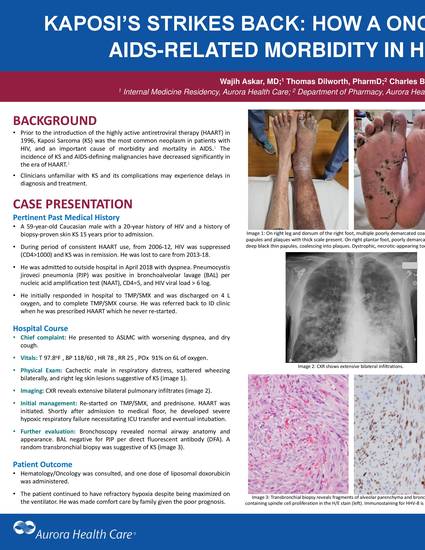
Introduction: The incidence of Kaposi Sarcoma (KS) in AIDS population has decreased significantly in the era of antiretroviral therapy (ART). Clinicians are not fully familiar with its pulmonary presentations which might lead to delay of diagnosis and treatment. Case Description: A 59-year-old Caucasian male, HIV-positive for >20 years, was diagnosed with right leg KS by biopsy 15 years ago. His course was complicated with ART refusal/interruption, consenting to ART only from 2006-12, during which HIV was suppressed and KS regressed and stabilized. He was lost to care from 2013-18. He was admitted in April 2018 with respiratory distress that required ICU and brief intubation. He was found to have Pneumocystis jiroveci pneumonia by bronchoalveolar lavage, CD4 of 5, and viral load of >6 log. The patient was discharged home with 4L of oxygen and to complete the TMP/SMX course and referred to outpatient infectious disease to resume ART. Three days after clinic and recommendation to resume ART, he was readmitted complaining of worsening dyspnea. Shortly after admission, respiratory failure developed necessitating ICU transfer. Bronchoscopy showed normal airway anatomy and appearance. Lung biopsy revealed spindle cell proliferation with positive herpesvirus8(HHV-8) stain. Liposomal doxorubicin was administered. Unfortunately, the patient continued with refractory hypoxia and was made comfort care by family. Discussion: KS, a low-grade vascular tumor associated with HHV-8, is the most common neoplasm in HIV patients. Studies reveal that environmental stressors such as hypoxia can stimulate its progenesis and oncogenesis activity. Despite the decline in the KS in recent years, pulmonary KS cases have been linked to interruption or lack of HIV care. The biology of KS and the importance of maintaining linkage to care to control and prevent KS complications will be reviewed.
Askar W, Dilworth T, Brummitt C. Kaposi's strikes back: How a once-common cause of aids-related morbidity in HIV re-emerged. American College of Physicians - 2018 Wisconsin Chapter Annual Scientific Mtg. Storyboard. September 7-8, 2018. Wisconsin Dells, WI.

Aurora St. Luke's Medical Center
Aurora Sinai Medical Center